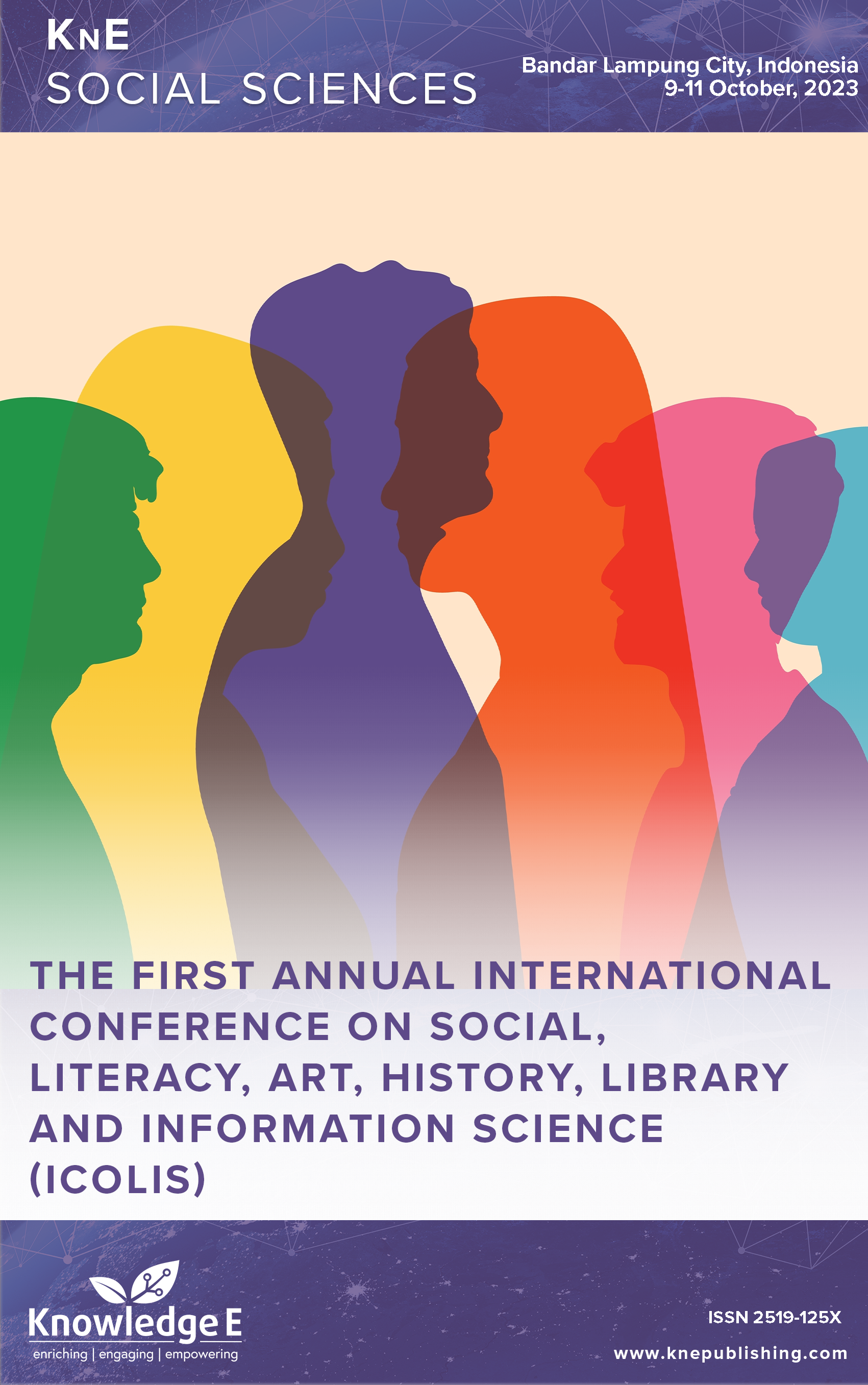The Use of UIN Raden Fatah's E-Library Application Reviewed from Total Quality Management (TQM)
DOI:
https://doi.org/10.18502/kss.v9i12.15843Abstract
This research is motivated by an interesting phenomenon of changing times marked by the mushrooming use of information technology that makes the Library able to provide all services quickly, precisely, accurately, anytime, and anywhere. And, in real-time these services can be utilized by users, namely the use of e-library applications applied at the UIN Raden Fatah Library is very interesting to be researched. This research is quantitative, and data were collected by using applications from the Library Science students of class 2020. To see the use of the application, researchers use the theory of total quality management (TQM) which is reviewed through 4 principles, namely the principles of user satisfaction, respect for users, management in line with facts, and continuous improvement. Of the four principles, the survey results are above the average of 50%, meaning that each indicator in each principle has good service quality such as a comfortable application interface, user-friendly application use, good and satisfactory e-library service quality, adequate collection, and can meet user needs. Library efforts that continuously add to existing collections in the e-library application are updated to the latest version. There is a huge need to socialize the use of the application and promotional activities for the application to continue to be carried out. The research data shows that the survey results 75% on average, have gone well. Based on the results of this simple research, all principles in TQM have achieved excellent scores, this is shown by the average acquisition of survey numbers above 50%.
Keywords: e-library, total quality management
References
Ibrahim A. ’Basic concepts of library management in realizing excellent service quality using a digital-based information retrieval system’. December, vol.2.No.2 (2014), 129–38 <http://journal.uin-alauddin.ac. id/index.php/khizanah-alhikmah/ article/download/147/113>.
Suharso P, Arifiyana IP, Wasdiana D. Higher Education Library Services in Dealing with Abstracts. Anuva. 2020;4(2):271–86. DOI: https://doi.org/10.14710/anuva.4.2.271-286
Dharma NO. The Relationship Between Undiksha Library Service Quality and User Satisfaction. J Soc Sci Humanit. 2014;2(2):222–38.
Hartini S. ‘Implementation of Total Quality Management (Tqm) Through Quality Culture’, Al-Kalam Journal of Communication. Business and Management. 2019;5(2):129. DOI: https://doi.org/10.31602/al-kalam.v5i2.1727
Wulogening HI, Timan A. Implementation of total quality management (TQM) in the principal’s planning management system. Journal of Educational Management Accountability. 2020;8(2):137–46. . 31282. DOI: https://doi.org/10.21831/jamp.v8i2.31282
Elva Rahmah, Marlini. ‘The Role of Leadership in Encouraging Organizations to Implement the Principles of Total Quality Management (TQM) in the Padang State University Library’. Pustaka Budaya. 2017;4(2):43–57.
Nurmalina. ‘Transformation of the UIN Raden Fatah Palembang Library towards a Research Library in the Big Data Era’, Libraria Journal. Libr J. 2021;9(1):15–6. DOI: https://doi.org/10.21043/libraria.v9i1.8453
Mustofa MB, Febrian MK, Wuryan S. Strengthen Interpersonal Communication in Improving Library Services for People with Disabilities. Wasilatuna: Jurnal Komunikasi dan Penyiaran Islam, 6.02 (2023), P. 64-75. https://doi.org/10.38073/wasilatuna.v6i02.1029.
Mustofa MB, Wuryan S. Urgensi Komunikasi Interpersonal Dalam Al-Qur’an Sebagai Pustakawan. Al-Hikmah Media Dakwah, Komunikasi, Sosial dan Kebudayaan, 2020; 11(2): 85-94. https://doi.org/10.32505/hikmah.v11i2.2544. DOI: https://doi.org/10.32505/hikmah.v11i2.2544
Mustofa MB, Febrian MK, Wuryan S. Strengthen Interpersonal Communication in Improving Library Services for People with Disabilities. Wasilatuna: Jurnal Komunikasi dan Penyiaran Islam, 2023; 6(02): 64-75. https://doi.org/10.38073/wasilatuna.v6i02.1029. DOI: https://doi.org/10.38073/wasilatuna.v6i02.1029
Wuryan S, Mustofa MB, Saputra R, Cahyani MP. Pengaruh Gaya Komunikasi Kepemimpinan dalam Pengelolaan Organisasi: tinjauan Analisis. KOMUNIKASIA. Journal of Islamic Communication and Broadcasting. 2023;3(1):1–23. DOI: https://doi.org/10.32923/kpi.v3i1.3349
Mustofa MB, Sugara GT, Wuryan S. Komunikasi Interpersonal Sebagai Strategi Untuk Meningkatkan Kepuasan Pengunjung: Sebuah Tinjauan Literatur diPerpustakaan. Al-Idza’ah: Jurnal Dakwah dan Komunikasi, 2023; 5(1): 30-46. https://doi.org/10.24127/al-idzaah.v5i1.3571. DOI: https://doi.org/10.24127/al-idzaah.v5i1.3571
Amaliah E, Mustofa MB, Kesuma MEK, Wuryan S, Ramadaniah D, Tamara SD. Peranan Teknologi Informasi Komunikasi Sebagai Media Pelayanan di Perpustakaan INSTIDLA. Tik Ilmeu: Jurnal Ilmu Perpustakaan dan Informasi, 2022; 6(2): 279-294. https://doi.org/10.29240/tik.v6i2.5075. DOI: https://doi.org/10.29240/tik.v6i2.5075
Mustofa MB, Iqbal R, Budianto A, Hidayat N. Integrasi Tradisi Literasi Keagamaan (Yasinan) Dalam Terciptanya Budaya Kerukunan Masyarakat. Nusantara Journal of Information and Library Studies (N-JILS), 2022; 5(1): 51-59. https://doi.org/https://doi.org/10.30999/n-jils.v5i1.2002.
Mustofa MB, Kesuma MEK, Yunita I, Amaliah E, Rahmawati DI. Pemanfaatan Media Pustaka Digital Dalam Membangun Perpustakaan Desa Berbasis Inklusi Sosial Di Masa Pandemi. Jurnal Informasi, Perpustakaan, dan Kearsipan ( JIPKA), 2021; 1(1): 1-13. http://dx.doi.org/https://doi.org/10.26418/jipka.v1i1.51150.
Mustafa MB, Wuryan S, Meilani F. Komunikasi Verbal dan Nonverbal Pustakawan Dan Pemustaka Dalam Perspektif Komunikasi Islam. At-Tanzir. Jurnal Ilmiah Prodi Komunikasi Penyiaran Islam. 2021;12(1):22–36. DOI: https://doi.org/10.47498/tanzir.v12i1.510
Mustofa MB, Wuryan S, Husnita TJ. Komunikasi Vertikal Dan Horizontal Antara Pustakawan Dan Pemustaka Dalam Layanan Perpustakaan Persfektif Islam. Al- Idza’ah: Jurnal Dakwah dan Komunikasi, 2021; 3(01): 1-9. https://doi.org/10.24127/alidzaah. v3i01.1517. DOI: https://doi.org/10.24127/al-idzaah.v3i01.1517
Mustofa MB, Putri MC, Wuryan S, Rahmawati DI. Aktivitas Komunikasi Interpersonal Pustakawan Dalam Meningkatkan Etos Kerja. Nusantara Journal of Information and Library Studies (N-JILS), 2021; 4(1): 89-102. https://doi.org/https://doi.org/10.30999/njils. v4i1.1293.
Mustofa MB, Wuryan S, Sholiha NA, Arif MM, Musa M. Kontribusi Komunikasi Interpersonal dalam Perspektif Islam di Lingkungan Organisasi UIN Raden Intan Lampung. KOMUNIKASIA. Journal of Islamic Communication and Broadcasting. 2021;1(1):56–68. DOI: https://doi.org/10.32923/kpi.v1i1.1839
Mustofa MB, Silvia I, Basyori A. Proses Komunikasi Interpersonal Dalam Lingkup Perpustakaan Melalui Model Konseling Layanan Pemustaka. Jurnal El-Pustaka. 2021;2(1): https://doi.org/10.24042/el-pustaka.v2i1.8769.

